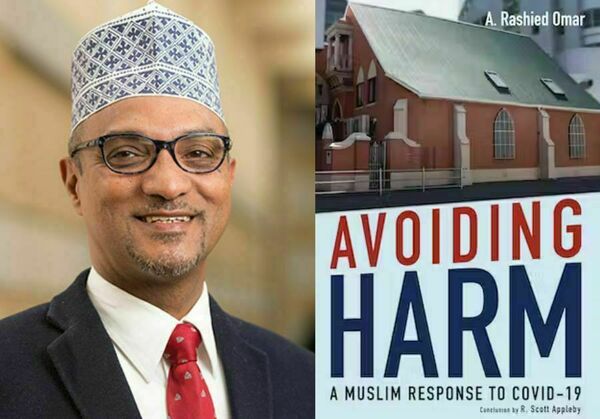
The Ansari Institute for Global Engagement with Religion along with the Kroc Institute for International Peace Studies is pleased to host a panel discussion celebrating the release of Rashied Omar's new book Avoiding Harm: A Muslim Response to Covid-19. Panelists will include Dean Scott Appleby who wrote the concluding chapter of the book as well as distinguised guests Anantanand Rambachan and Azza Karam.
This event will be offered in person and will also be livestreamed. Please go to this website for the livestream of the event.
About the Book
Research scholars have lamented the fact that most of the extant studies on religious responses to the COVID-19 pandemic focus on a particular religious group, typically Christian. This book fills this lacuna by providing some useful insights into how one Muslim religious institution responded to the pandemic. It portrays the sermons, advice, and guidance provided to the Claremont Main Road Mosque (CMRM) congregation in Cape Town, South Africa, by its Imams and elected board of governors during the course of the pandemic.
About the Author, Professor Rashied Omar
A. Rashied Omar earned an MA and PhD in religious studies from the University of Cape Town, South Africa, and an MA in international peace studies from Notre Dame. During Notre Dame’s spring semester, Omar teaches a popular course on the Islamic ethics of war and peace as well as peace studies courses. For the remainder of the year, he serves as field research advisor to master of global affairs students in Cape Town, South Africa. In addition to being a university-based researcher and teacher, Omar serves as imam (religious minister) at the Claremont Main Road Mosque in Cape Town, South Africa, a trustee of the Healing of Memories Institute in South Africa, a member of the Interfaith Council for Ethics Education, Arigatou International in Japan, and an advisory board member for Critical Investigations into Humanitarianism in Africa. Omar’s research and teaching focus on the roots of religious violence and the potential of religion for constructive social engagement and interreligious peacebuilding. He is co-author with David Chidester et al. of Religion in Public Education: Options for a New South Africa (UCT Press, 1994), a contributor to the Oxford Handbook of Religion, Conflict and Peacebuilding (Oxford University Press, 2015), and a contributor to the Encyclopedia of Islam and the Muslim World (Macmillan Reference USA, 2016).
About Azza Karam

Azza Karam, an advisory board member of the Ansari Institute, is the p[resident of Women's Learning Partnership. The Women's Learning Partnership is a collective of 20 autonomous women's rights organizations in the Global South that promote women’s leadership and human rights. She is the immediate past secretary general of Religions for Peace. Karam served nearly two decades in the United Nations (in UNDP and UNFPA), where she coordinated the Arab Human Development Reports, co-founded and chaired the United Nations Inter-Agency Task Force on Religion — with over 20 UN system bodies — and founded and convened its Multi Faith Advisory Council, as part of the 750 global NGO database she coordinated. Prior to the United Nations, Karam worked internationally with intergovernmental organizations such as the OSCE, the EU, and the International IDEA, in sub-Saharan Africa, the Middle East, Europe, and East and Central Asia. She has published widely, and lectured at various universities including West Point Military Academy. In 2022, she was awarded an honorary degree by John Cabot University in Rome, Italy. Born in Egypt, Azza is also a citizen of the Netherlands.
About Anantanand Rambachan

Anantanand Rambachan is professor emeritus of religion at Saint Olaf College, Minnesota. He was also visiting professor at the Academy for the Study of World Religions at the University of Hamburg in Germany (2013-17). His books include: Accomplishing the Accomplished: The Vedas as a Source of Valid Knowledge in Shankara, The Limits of Scripture: Vivekananda's Reinterpretation of the Authority of the Vedas, The Advaita Worldview: God, World and Humanity, A Hindu Theology of Liberation and Essays in Hindu Theology. His scholarly interests include: the Advaita (Non-dual) Vedanta tradition, Hindu ethics, liberation theology, and interreligous dialogue. The British Broadcasting Corporation transmitted a series of 25 lectures on Hinduism by Prof. Rambachan around the world. He was recently elected as co-president of Religions for Peace, the largest global interfaith network.
About Scott Appleby

Scott Appleby is professor of history and the Marilyn Keough Dean of the Keough School of Global Affairs at the University of Notre Dame. Previously he directed Notre Dame’s Cushwa Center for the Study of American Catholicism and the Keough School’s Kroc Institute for International Peace Studies. The author or editor of fifteen books, Appleby examines the ways religions and religiously inspired actors shape and are shaped by modern ideas, institutions, practices and conflicts. His publications include The Ambivalence of the Sacred: Religion, Violence and Reconciliation, The Oxford Handbook of Religion, Conflict and Peacebuilding, and the five volumes of the The Fundamentalism Project (University of Chicago Press), which he edited with Martin E. Marty.
Co-sponsored by the Kroc Institute for International Peace Studies.
Originally published at ansari.nd.edu.